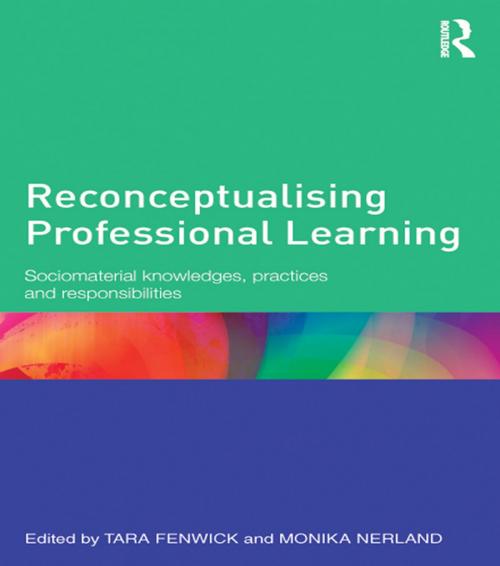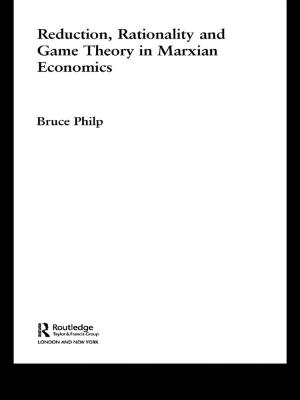Reconceptualising Professional Learning
Sociomaterial knowledges, practices and responsibilities
Nonfiction, Reference & Language, Education & Teaching, Educational Theory, Adult & Continuing Education, Educational Reform| Author: | ISBN: | 9781317802365 | |
| Publisher: | Taylor and Francis | Publication: | March 14, 2014 |
| Imprint: | Routledge | Language: | English |
| Author: | |
| ISBN: | 9781317802365 |
| Publisher: | Taylor and Francis |
| Publication: | March 14, 2014 |
| Imprint: | Routledge |
| Language: | English |
This book presents leading-edge perspectives and methodologies to address emerging issues of concern for professional learning in contemporary society. The conditions for professional practice and learning are changing dramatically in the wake of globalization, new modes of knowledge production, new regulatory regimes, and increased economic-political pressures. In the wake of this, a number of challenges for learning emerge:
- more practitioners become involved in interprofessional collaboration
- developments in new technologies and virtual workworlds
- emergence of transnational knowledge cultures and interrelated circuits of knowledge.
The space and time relations in which professional practice and learning are embedded are becoming more complex, as are the epistemic underpinnings of professional work. Together these shifts bring about intersections of professional knowledge and responsibilities that call for new conceptions of professional knowing.
Exploring what the authors call sociomaterial perspectives on professional learning they argue that theories that trace not just the social but also the material aspects of practice – such as tools, technologies, texts but also bodies and actions - are useful for coming to terms with the challenges described above.
Reconceptualising Professional Learning develops these issues through specific contemporary cases focused on one of the book’s three main themes: (1) professionals’ knowing in practice, (2) professionals’ work arrangements and technologies, or (3) professional responsibility. Each chapter draws upon innovative theory to highlight the sociomaterial webs through which professional learning may be reconceptualised. Authors are based in Australia, Canada, Italy, Norway, Sweden, and the USA as well as the UK and their cases are based in a range of professional settings including medicine, teaching, nursing, engineering, social services, the creative industries, and more.
By presenting detailed accounts of these themes from a sociomaterial perspective, the book opens new questions and methodological approaches. These can help make more visible what is often invisible in today’s messy dynamics of professional learning, and point to new ways of configuring educational support and policy for professionals.
This book presents leading-edge perspectives and methodologies to address emerging issues of concern for professional learning in contemporary society. The conditions for professional practice and learning are changing dramatically in the wake of globalization, new modes of knowledge production, new regulatory regimes, and increased economic-political pressures. In the wake of this, a number of challenges for learning emerge:
- more practitioners become involved in interprofessional collaboration
- developments in new technologies and virtual workworlds
- emergence of transnational knowledge cultures and interrelated circuits of knowledge.
The space and time relations in which professional practice and learning are embedded are becoming more complex, as are the epistemic underpinnings of professional work. Together these shifts bring about intersections of professional knowledge and responsibilities that call for new conceptions of professional knowing.
Exploring what the authors call sociomaterial perspectives on professional learning they argue that theories that trace not just the social but also the material aspects of practice – such as tools, technologies, texts but also bodies and actions - are useful for coming to terms with the challenges described above.
Reconceptualising Professional Learning develops these issues through specific contemporary cases focused on one of the book’s three main themes: (1) professionals’ knowing in practice, (2) professionals’ work arrangements and technologies, or (3) professional responsibility. Each chapter draws upon innovative theory to highlight the sociomaterial webs through which professional learning may be reconceptualised. Authors are based in Australia, Canada, Italy, Norway, Sweden, and the USA as well as the UK and their cases are based in a range of professional settings including medicine, teaching, nursing, engineering, social services, the creative industries, and more.
By presenting detailed accounts of these themes from a sociomaterial perspective, the book opens new questions and methodological approaches. These can help make more visible what is often invisible in today’s messy dynamics of professional learning, and point to new ways of configuring educational support and policy for professionals.















